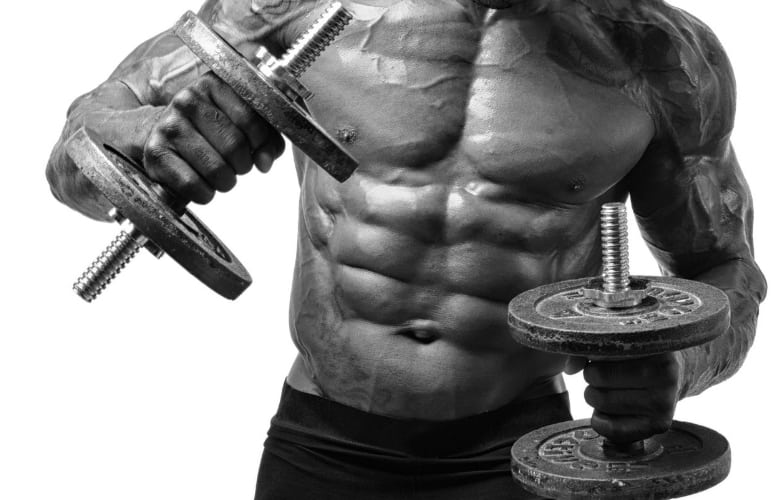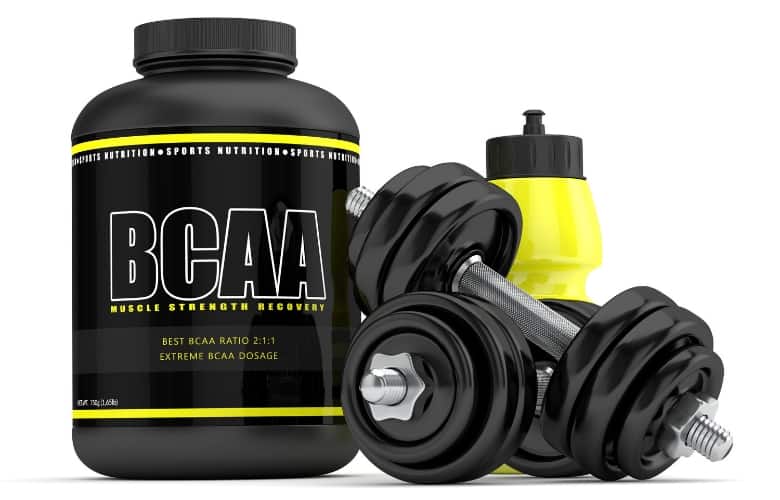What are branched chain amino acids?
Have you reached a plateau with your training? Or maybe just not making the consistent gains that you have become accustomed to? Well – that is exactly what happened with my quest for building muscle. I was stuck at the same max weight for most of my lifts. That was before I tried branched chain amino acids (BCAAa).
BCAA’s are easy to use and provide so much benefit to bodybuilders! I wish I had learned about them years ago.
Essentially, a BCAA is an amino acid with a branched chain. The three main amino acids in BCAAs are called leucine, isoleucine, and valine.
How do BCAAs help bodybuilders?

Increase protein synthesis
BCAAs, particularly in combination with strength training, can dramatically promote protein synthesis in the muscles. This in turn contributes to muscle hypertrophy. You get bigger, faster if you take BCAAs.
Decrease muscle soreness
BCAAs, consumed shortly after a workout, induce the release of glucose and insulin. Glucose and Insulin act to encourage muscle cells to take up nutrition and amino acids in order to repair themselves more rapidly.
You then experience less soreness after a workout and it lasts for a shorter amount of time.
Reduce exercise fatigue
During a hard workout, serotonin levels rise in the brain. This causes feelings of fatigue. Serotonin is synthesized from tryptophan, which is imported into the brain during exercise.

BCAAs can compete with tryptophan for entry into the brain, thus simultaneously preventing serotonin from rising and inducing a burst of energy from the direct effects of the BCAAs on the brain.
Reduce protein breakdown
BCAAs directly inhibit protein breakdown pathways in several time-dependent ways.
They immediately act to prevent protein breakdown by directly blocking the activities that break down muscle proteins. They also act long-term to prevent protein breakdown by inhibiting expression of the genes that produce the enzymes active in these complexes.
Prevent muscle wasting
We all know that in order to get that “shredded” look that is so impressive, in addition to building muscle, you have to diet. This is in order to eliminate as much body fat as possible.
Unfortunately, reduced calorie diets have a tendency to induce loss of muscle, thus reducing your hard-earned size. Taking BCAAs while dieting can prevent this loss of size while you get shredded.
Have better workouts
In general, BCAAs can improve the quality of your workouts, encouraging you to work your hardest to achieve your goals. They are also essential during the post-workout recovery period to encourage your muscles to gain mass.
Energy boost
BCAAs are active in inducing the liver to release stored glucose into the bloodstream to provide energy to hard-working muscles.
In addition, BCAAs can be directly converted into glucose in the liver. This is to provide an additional energy boost during a hard workout that has depleted your glucose stores.
Enhanced strength
BCAAs are essential for boosting the muscle hypertrophy response post-workout that leads to inches gained and a stronger you.
Its effects on enhancing workouts also allows bodybuilders to work harder per workout, leading to rapid and impressive gains in strength as well as size.

Fat loss
BCAAs induce release of stored glucose from the liver and other parts of the body during a workout, glucose that is immediately metabolized into a better workout.
Thus, any calories you consume in a meal after your workout are used to replenish the glucose stores rather than being diverted into body fat production.
What is the best ratio of BCAAs?
Your BCAA supplement should have a 2:1:1 ratio of leucine:isoleucine:valine.
What is the difference between essential and non-essential amino acids?
As we all know, amino acids are the building blocks of protein.
There are 20 basic amino acids plus a few other special ones that are produced by modifications of the basic amino acids but are rarely used in the body.
There are nine essential acids, four non-essential amino acids, and seven conditional amino acids. They are given these names based on whether they must be consumed in the diet or whether the human body can synthesize them from other ingredients consumed in the diet.
Essential amino acids must be consumed in the diet; the three primary BCAAs are all essential amino acids.
Non-essential amino acids can be synthesized by the body. Conditional amino acids can be synthesized by the human body, but during times of stress or illness the body cannot manufacture enough of them and better health can be maintained if they are consumed in the diet to supplement the body’s efforts at synthesizing them.
Scientific studies prove the effectiveness Of BCAAs
BCAAs have been extensively studied, but one of the more pivotal studies from the viewpoint of bodybuilding was conducted in rats.
An enzyme called P70 in both humans and rats is an essential component in the adaptive hypertrophy response of muscle to strength training.
In the study on rats, BCAAs were found to strongly activate P70, which induced protein synthesis in the muscles and promoted muscle hypertrophy and recovery after exercise.
In rats deprived of BCAAs, these processes did not occur and recovery was prolonged.
In a human study of resistance training, athletes taking leucine supplements reported greater gains in muscle strength. In another human study of athletes doing squats, BCAA supplements reduced post-workout soreness.
A number of other studies have been conducted on endurance athletes, but it is unclear if their findings apply to bodybuilders.
Which foods are high In BCAAs?
Many foods can provide BCAAs, and even whey protein supplements are a good source of BCAAs.
However, foods and whey need to be digested before they can release any BCAAs into the bloodstream; they can provide a good steady-state level of BCAAs in between workouts, but when you need a quick burst of BCAAs, a supplement is your best source.
A supplement containing free BCAAs doesn’t need to be digested and instead is very rapidly absorbed into the blood (it takes less than 30 minutes) and they are then delivered to the muscles and brain, where they are needed.
Foods that are good dietary sources of BCAAs include:
- Whey
- Dairy products
- Beef, chicken, fish, pork, eggs
- Beans
- Nuts
What are the differences between amino acids and branched chain amino acids?
The basic definition of a branched-chain amino acid is the presence of a branched-chain side group. These side groups confer different properties of BCAAs that the other amino acids do not have.
For example, unlike most amino acids, which are oxidized in the liver, BCAAs are oxidized directly in the skeletal muscles.
When should I take BCAAs?
Before the workout
A BCAA supplement should be taken immediately before each workout to fuel the body throughout the workout.
During the workout
If you start to “hit the wall” or feel fatigued during a workout, taking an additional BCAA supplement can help you push through it for greater gain.
After the workout
A BCAA supplement should definitely be taken after each workout. This is to ensure your muscles respond properly to the workout by gaining mass and to speed up recovery from the workout.
Dosage – how much should I take?
In general, a dose of 91 mg per pound of body weight per day should be taken in addition to good sources of complete proteins.
This same dose should be taken every day, not just on workout days. If taken on workout days, it should be split into thirds, pre-workout, mid-workout, and post-workout.
On non-workout days, it can also be split into thirds, each taken with a meal.
I am vegan – can I take BCAAs?
When people think about sources of protein, they usually picture meat. But vegans, don’t despair! Plants produce BCAAs in large quantities and there are several commercial vegan BCAA supplements available.
Are there any side effects from taking BCAAs?
In general, people do not report any side effects from taking BCAAs other than some people who report developing nausea when they take a BCAA supplement on an empty stomach.
However, be aware there was a troubling study suggesting there may be a link between taking large amounts of BCAA supplements for many years and an increased risk of developing amyotrophic lateral sclerosis (ALS, or Lou Gehrig’s disease). This association has not been proven or confirmed.
In addition, some studies in rodents suggest that taking excessive amounts of BCAAs may promote obesity, insulin resistance, and the development of metabolic syndrome, but these findings have not been replicated in humans.
Whether these findings will be confirmed is unclear, but they do suggest it is important to use the correct amount of BCAAs and not overdo it.
Are they expensive? What will they cost me per month?
Don’t be scared! BCAA supplements are really quite inexpensive. Even a high-quality BCAA supplement will cost less than $100 a month for a large beefy guy, and smaller men and women rarely spend more than $50 a month for their BCAA.
Affordable supplements are readily available at many stores and online marketplaces.
Wrapping up – is it worth taking?
Yes! BCAAs are definitely worth taking if you want to take your training to the next level.
Your workouts will be easier, your recovery will be less painful, and more importantly, BCAAs will maximize your muscle gain and help you keep it while you get shredded.

7 thoughts on “Definitive Guide to BCAA’s for Bodybuilders. Updated for 2019”
Seu blog é um sucesso, muito completo. Ahhh quando a paixão está lá, tudo é 🙂 Leanora Andrew Mehetabel
Das Lesen Ihres Artikels hat sehr viel Spaß gemacht. Hana Riordan Lavine
Als Neuling suche ich immer online nach Artikeln, die mir zugute kommen können. Vielen Dank Adiana Ab Cotterell
Puedo encontrar buena información de este artículo. Arabelle Avram Meisel
Angenommen, Sie machen gute Links, um Sie auf den ersten Seiten von Suchmaschinen zu positionieren.
Jen Georgie Matthaus
Good respond in return of this issue with firm arguments and describing everything concerning that. Gilbertine Griffith Vescuso
Matkap nedir ne işe yarar? firması aslında şirketleri yoğun hız ile çalışıyorlar.
Türkiye metal kesimde ilerlemektedir.